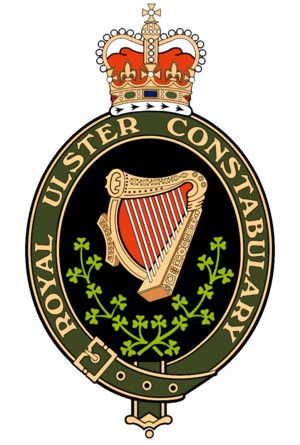Police (Northern Ireland) Act 2000 facts for kids
| Act of Parliament | |

|
|
| Long title | An Act to make provision about policing in Northern Ireland; and for connected purposes. |
|---|---|
| Citation | 2000 c 32 |
| Territorial extent | Northern Ireland |
| Dates | |
| Royal assent | 23 November 2000 |
| Other legislation | |
| Amended by | Police (Northern Ireland) Act 2003 Justice Act (Northern Ireland) 2011 |
|
Status: Current legislation
|
|
| Text of statute as originally enacted | |
| Revised text of statute as amended | |
The Police (Northern Ireland) Act 2000 is a law from the Parliament of the United Kingdom. This important Act changed the name of the Royal Ulster Constabulary (RUC) to the Police Service of Northern Ireland (PSNI). It also created new groups like the Northern Ireland Policing Board and District Police Partnerships. The main goal of this Act was to get everyone in Northern Ireland to support the police. It introduced new ideas, such as a different oath for officers and a special rule for hiring new police officers. This rule aimed for an equal number of Protestant and Roman Catholic officers.
The idea for this law was first discussed in the House of Commons on May 16, 2000.
Contents
Why the Act Was Needed
The Royal Ulster Constabulary (RUC) was the main police force in Northern Ireland for many years. It was formed before Ireland was divided. During a time of conflict called The Troubles, some people felt the RUC was unfair to the nationalist community. Despite these concerns, the RUC was known for being very good at fighting terrorism. They even received a special award called the George Cross from Queen Elizabeth II.
After the Good Friday Agreement in 1998, which aimed to bring peace to Northern Ireland, a special group was set up. This group, led by Chris Patten, looked at how policing could be fair for everyone. Their report, called the Patten Report, suggested changing the RUC. They thought the police force should have a new name and fewer officers. The Police (Northern Ireland) Act was created to make these changes happen.
New Name for the Police
One of the first things the Act did was change the name of the police force. The Patten Report first suggested "Northern Ireland Police Service." However, the government of the United Kingdom changed this to "Police Service of Northern Ireland" (PSNI). They did not like the shorter name's initials.
Some politicians, especially unionists, wanted the new police force to keep the word "Royal" in its name. They felt it honored the history of the Royal Ulster Constabulary. But in the end, the government found a middle ground. The Act decided the official name would be "Police Service of Northern Ireland (incorporating the Royal Ulster Constabulary)." The Act also created the Royal Ulster Constabulary George Cross Foundation. This foundation was set up to remember the brave actions of the RUC.
New Police Leadership
The Act created a new group called the Northern Ireland Policing Board. This board took over from the old Police Authority of Northern Ireland. The Patten Report wanted this board to include politicians. It also suggested local police groups that would work with local councils.
The leader of Sinn Féin, Gerry Adams, wanted all of the Patten Report's ideas to be used. But some unionists worried that these local groups might give too much power to members of the IRA. So, the plans were changed slightly. This allowed police chiefs to challenge decisions made by the board. Because of these changes, Sinn Féin first refused to join the Policing Board. They eventually joined in 2007.
How New Officers Are Hired
The Act also included rules for hiring new police officers. It said that the police force should become smaller over ten years. This was because the force was considered too big for a time of peace. Officers who chose to leave were offered a good payment.
When the Act was passed, there were many more Protestant officers than Catholic officers in the RUC. The Act introduced a special rule for hiring. It said that new officers would be hired on a 50:50 basis. This meant an equal number of Protestant and Catholic recruits. The goal was to make the police force eventually 50 percent Protestant and 50 percent Catholic. This idea also hoped that the Gaelic Athletic Association (GAA) would change its rule. This rule stopped members of British police forces from playing Gaelic games. The GAA did change this rule in 2001. The Act also continued a change from 1997. This change meant new police officers no longer had to swear an oath of loyalty to the Queen.
In 2011, the British government decided to stop the 50:50 hiring rule. By then, about 30 percent of the police force was Catholic. Some politicians felt the rule had been successful. However, others believed it was unfair to Protestants. Some Catholic religious leaders have asked for the 50:50 rule to be brought back.
Other Important Rules
The Act also allowed for police cooperation between Northern Ireland and the Republic of Ireland. This meant officers from the PSNI could work with the Garda Síochána (the police in the Republic of Ireland), and vice versa.
The Act also gave the Secretary of State for Northern Ireland the power to decide on the PSNI's uniform and flags. The new uniform kept the dark green color of the RUC. It also included name tags, even though the Police Federation did not want them. The Secretary of State could also decide if the Union Jack flag could fly over PSNI police stations. This flag had flown over RUC stations before.
See also
 | Anna J. Cooper |
 | Mary McLeod Bethune |
 | Lillie Mae Bradford |


